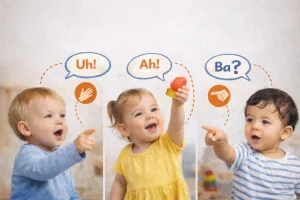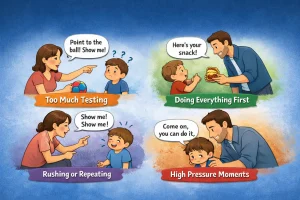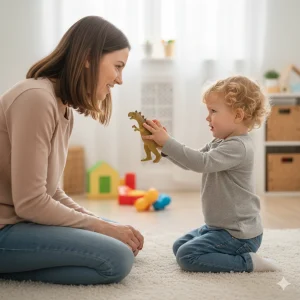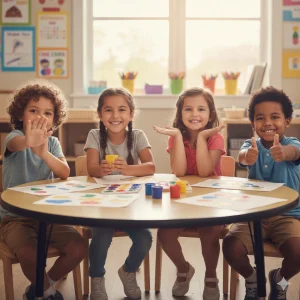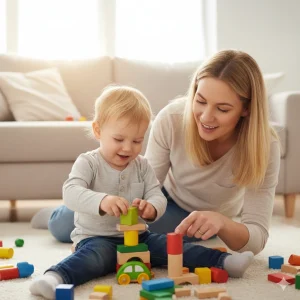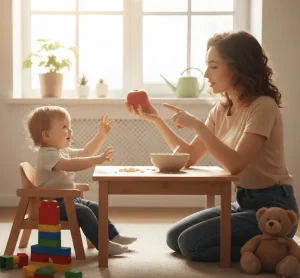Why Does My 2-Year-Old Still Call Themselves by Name?
By Rajini D
Last Updated: July 24, 2025
If your toddler talks like this—using their name instead of saying “I” or “me”—you might be wondering if it’s a cause for concern. The good news? In most cases, it’s completely normal. This behavior is often just a part of 2-year-old speech development, as children learn how to speak and understand themselves.
In this article, we’ll explain why your 2-year-old calls themselves by name, when most children begin using “I” and “me,” and when it might be helpful to talk to a speech therapist. You’ll also discover simple, fun ways to support your child’s speech at home—and how Wellness Hub can help if you need extra guidance.
Free Speech Help for Kids
Concerned about speech delays? Book a free consultation with our expert speech therapist and get guidance tailored to your child’s needs.
Is It Normal for a 2-Year-Old to Call Themselves by Name?
Yes, it’s completely normal for a 2-year-old to call themselves by name instead of saying “I” or “me.” Many toddlers go through this stage as they’re learning how language works. It might sound a bit odd at first—like, “Riya wants milk” instead of “I want milk”—but this is actually a common part of early speech development.
Young children often refer to themselves by name because it’s what they hear the most. Parents, siblings, and caregivers usually say their name all the time: “Riya, do you want this?” or “Come here, Riya!” Naturally, they pick that up and use it before they learn personal pronouns like “I,” “me,” or “mine.”
When Do Toddlers Start Using “I” and “Me”?
Most children begin using pronouns between 2.5 and 3 years of age, but every child is different. Some may pick them up earlier, while others take a little longer. What matters more is the overall progress in their speech and language skills.
If your child understands what you say, responds when spoken to, and uses a mix of words and gestures to communicate, there’s usually no need to worry. Calling themselves by name is just one of many early speech patterns that evolve over time.
What’s Behind This? A Quick Look at Toddler Ego Development
This stage also ties into something called ego development. At age two, toddlers are just beginning to understand that they are separate individuals. The concept of “I” or “me” requires a bit of self-awareness—and that takes time to develop. Using their own name feels more concrete and familiar to them, especially while they’re still learning to express thoughts and emotions.
When to Watch Closely
While this behavior is generally normal, it’s helpful to watch for other speech milestones. By age 2:
- Your child should be using simple 2-word phrases (like “want toy” or “more juice”)
- They should follow simple directions
- They should use at least 50 words and begin combining them
If your 2-year-old still isn’t using basic words or shows signs of pronoun confusion along with limited vocabulary or difficulty understanding, it may be time to check in with a professional about signs of a speech delay.
Why Toddlers Talk in the Third Person
Toddler Ego and Language Development
It can be surprising when your toddler talks about themselves like someone else—“Ayaan wants juice” instead of “I want juice.” But don’t worry—this is a very common part of early language development and closely tied to how toddlers are learning about themselves and the world around them.
At around age 2, children are still figuring out their sense of identity. They hear their name used constantly by others—“Ayaan, come here,” or “That’s Ayaan’s toy”—so it’s no surprise they start copying that. Using their own name feels more familiar and safe, especially while they’re still learning to put words together.
This behavior is also linked to something called toddler ego development. Toddlers haven’t fully grasped the idea of “self” in the way adults do. Saying “I” or “me” takes a deeper level of understanding and self-awareness, which gradually builds over time.
The good news? Talking in the third person is usually a short-lived phase. As toddlers develop more language and emotional awareness, they naturally begin to shift from using their name to using personal pronouns like “I,” “me,” and “mine.”
When Should Toddlers Start Using “I” and “Me”?
Most children begin using pronouns like “I” and “me” between 2.5 and 3 years of age. But every child is different—some toddlers may start earlier, while others take a little longer.
If your child is talking in short sentences, following directions, and steadily picking up new words, it’s usually nothing to worry about. The shift from third-person speech to pronouns often happens naturally as part of speech milestones.
However, if your 2.5-year-old is still only using their name and isn’t combining words or expressing needs clearly, it’s worth keeping an eye on their overall speech development.
When to Worry About Toddler Speech Development
It’s completely natural to wonder if your toddler’s speech is on track—especially when they’re still calling themselves by name or not using words like “I” or “me.” While many children grow out of this phase on their own, there are some signs that may suggest your child needs a little extra support.
What’s Expected at Age 2
By the time your child turns 2, most toddlers:
- Use 50 or more words
- Combine two words (like “want milk” or “go park”)
- Understand simple directions
- Start using early pronouns, though not always correctly
If your child is meeting most of these milestones, using their name instead of “I” is often just part of their learning process.
Signs to Watch For: When to Be Concerned
Here are a few red flags to watch out for, especially around age 2 to 2.5:
- Your child rarely speaks or uses very few words
- They only speak in single words (no combining yet)
- They don’t try to copy sounds or repeat after you
- Your child still only refers to themselves by name with no use of “I,” “me,” or “mine”
- They don’t point to things or respond to simple instructions
- They seem to struggle with understanding or rarely make eye contact
These could be early signs of a speech delay or even a language-related concern such as autism spectrum disorder, where challenges with pronouns and social language are more common.
But remember—one delay doesn’t automatically mean something serious. Children develop at different speeds, and some just need a little extra time or support to catch up.
How to Help Your Toddler Use Pronouns Like “I” and “Me”
Hearing your toddler say their own name all the time instead of “I” can be cute—but you may wonder how to gently help them move forward. The good news is that learning to use pronouns is a natural part of toddler speech development, and with a little practice and patience, most kids get there.
Let’s look at some easy, playful ways to support pronoun learning at home.
Fun and Easy Tips at Home
Model the Right Words During Everyday Talk
Your toddler learns best by listening to you. Use clear, simple sentences that include pronouns:
- Instead of “Mummy will help,” say “I will help you.”
- Say things like “I want coffee. Do you want juice?”
- Use “you,” “me,” and “mine” naturally in conversation.
They may not copy right away, but they’re always soaking it in.
Use Pretend Play to Practice
Pretend play is one of the best tools for building language. Use dolls, animals, or action figures and talk through the scenes:
- “I am hungry,” says the teddy.
- “I want to jump,” says the bunny.
Encourage your child to speak for the toys using “I” and “me” too. This playful approach makes it easier to practice without pressure.
Read Books That Use Pronouns
Choose storybooks where characters talk in the first person. As you read, point out words like “I” and “my,” and repeat them clearly. Ask simple questions:
- “Who said that?”
- “Can you say ‘I am happy’ like the bunny?”
Books help toddlers hear pronouns in context, making it easier to connect the words with real life.
What Not to Do
Don’t Force or Overcorrect
It’s tempting to jump in with corrections, but this can backfire. Gently repeat the phrase correctly instead:
- Child: “Riya want toy.”
- You: “Oh! I want the toy. Let’s get it!”
This way, they hear the correct version without feeling pressured.
Avoid Turning It Into a Power Struggle
If your toddler resists using new words, that’s okay. Pronoun learning is just one piece of speech development. Keep things positive and low-pressure. It’s more important to keep communication fun and flowing than to get every word right.
When to Talk to a Speech Therapist
If your 2-year-old still only refers to themselves by name—and also shows other signs of speech delay—it might be time to consider reaching out to a professional. While many toddlers go through this third-person phase as part of normal development, sometimes it’s a clue that they need a little extra support.
Signs Your Toddler Might Need Speech Support
If you’re wondering “Should I be worried?”, here are some signs that it’s worth checking in with a speech therapist:
| On Track | Might Need Support |
|---|---|
| Uses 50+ words | Uses fewer than 20 words |
| Combines 2-word phrases (“want juice”) | Only says single words |
| Follows simple directions | Doesn’t respond to name or commands |
| Begins using “I” or “me” | Only uses their name for self-reference |
| Tries to copy sounds and words | Rarely imitates words or gestures |
If your child is only calling themselves by name and also showing delays in other areas (like not following instructions or having trouble combining words), it may be time for an evaluation.
Why Early Speech Therapy Matters
Early support makes a big difference in your child’s communication skills. The earlier speech delays are identified and supported, the easier it is to build strong language skills that help with learning, social interaction, and confidence.
Speech therapists help with:
- Teaching pronouns like “I,” “me,” and “mine”
- Expanding vocabulary and sentence use
- Improving attention, listening, and turn-taking
- Addressing signs of speech delay or possible autism spectrum concerns
Could It Be a Sign of Autism?
In some cases, toddlers who avoid using “I” and show other language or social challenges may be showing early signs of autism spectrum disorder, where challenges with pronouns and social language are more common.
Other signs might include:
- Repetitive speech or behavior
- Difficulty making eye contact
- Trouble engaging in back-and-forth play or conversation
- Lack of interest in people or toys
If you’ve noticed a combination of red flags, getting help early gives your child the best chance to thrive.
Conclusion
Every toddler grows at their own pace—and it’s normal if your 2-year-old still calls themselves by name. Most kids learn to say “I” and “me” with time and gentle support. If you’re unsure or notice other delays, early help can really make a difference. You don’t have to wait or worry alone. At Wellness Hub, we offer expert-led speech therapy for toddlers to support their growth in a fun, loving way. Explore our tools, talk to a therapist, and take the next step with confidence.
Frequently Asked Questions:
1. Is it normal for a 2-year-old to refer to themselves by name?
Yes, this is completely normal for many toddlers. At this age, they’re still learning how to talk about themselves. Since they hear others using their name all the time—like “Riya, do you want milk?”—they naturally repeat it. Most toddlers move on to using “I” or “me” as their speech develops.
2. When do toddlers start using “I” and “me”?
Toddlers usually start using personal pronouns like “I,” “me,” and “mine” between 2.5 and 3 years of age. But every child is different. Some learn earlier, while others take more time. If your child is speaking in short phrases and learning new words, they are likely on the right track.
3. Why does my toddler talk in the third person?
This is often part of early language development. Talking in the third person means they use their name instead of saying “I.” This happens because toddlers are still figuring out who they are and how to talk about themselves. It also connects to ego development in toddlers, which takes time to grow.
4. Should I be worried if my child only uses their name at age 2.5?
If your child only refers to themselves by name and also has trouble with other speech skills—like using very few words or not putting two words together—it’s a good idea to talk to a speech therapist. Early support can make a big difference in helping your child catch up.
5. Is calling themselves by name a sign of autism?
It can be—but not always. Many toddlers without autism also go through this phase. However, consistent pronoun confusion along with other signs—like not making eye contact, repeating the same phrases, or not responding to people—may be linked to autism. If you notice several signs, talk to a professional.
6. How can I teach my toddler to use “I” and “me”?
You can help by:
- Using pronouns in your everyday talk (e.g., “I want a cookie”)
- Playing with dolls or toys and making them talk (“I’m jumping!”)
- Reading books where characters say “I,” “me,” or “my”
Repeat these naturally and often—toddlers learn through hearing and copying.
7. What are red flags in toddler speech development?
Watch for these signs, especially around age 2:
- Not using 50 words or more
- Not combining two words (like “want toy”)
- Not using any pronouns like “I,” “me,” or “mine”
- Not following simple directions
- Rarely responding to name or making eye contact
If you notice these, your child might benefit from speech therapy.
8. Can speech therapy help with pronoun learning?
Absolutely. A speech therapist for toddlers can work on pronoun use, vocabulary, sentence-building, and social communication. Therapy sessions are fun, play-based, and designed to match your child’s level and learning style. Even a few sessions can build strong communication habits early on.
9. How do I know if my child has a speech delay?
Speech delays look different in every child, but some common signs include:
Speaking fewer than 50 words by age 2
- Not using 2-word combinations like “go park”
- Difficulty understanding basic instructions
- Not trying to copy sounds or gestures
If you’re seeing these signs, it’s best to get a professional opinion.
10. Where can I find help for toddler speech delay online?
You can get expert help from the comfort of home through Wellness Hub’s online speech therapy programs. We offer personalized guidance, early screenings, and fun therapy sessions that help toddlers learn to speak clearly and confidently. Early support gives your child the best chance to succeed.
About the Author:
Rajini Darugupally
M.Sc., Speech-Language Pathologist (9+ years of experience)
Rajini is a passionate and dedicated Speech-Language Pathologist with over 9+ years of experience, specializing in both developmental speech and language disorders in children and rehabilitation in adults. Driven by a desire to empower each individual to find their voice, Rajini brings a wealth of experience and a warm, genuine approach to therapy. Currently, at Wellness Hub, she thrives in a team environment that values innovation, compassion, and achieving results for their clients.
Book your Free Consultation Today
Parent/Caregiver Info:
Client’s Details:
* Error Message
